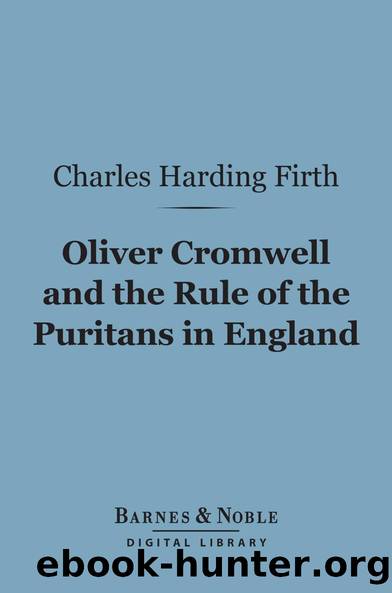Oliver Cromwell and the Rule of the Puritans in England by C. H. (Charles Harding) Firth

Author:C. H. (Charles Harding) Firth [Firth, C. H.]
Language: eng
Format: epub
ISBN: 9781720050070
Google: 5IA9zAEACAAJ
Publisher: Independently Published
Published: 2018-09-03T00:40:41+00:00
CHAPTER XIII
IRELAND
1649â1650
The Second Civil War had its counterpart in Ireland, where in May, 1648, Lord Inchiquin and the Munster Protestants threw off obedience to the Parliament and hoisted the royal standard. Ormond returned again to Ireland in September, 1648, and by January, 1649, he succeeded in uniting Anglo-Irish Royalists and Confederated Catholics in a league against the adherents of the Parliament. In vain Rinuccini, the Papal Nuncio, opposed the league. The freedom and equality promised to the Catholic religion, the independence promised to the Irish Parliament, allured many even of the clergy to Ormondâs support. They called on the Irish soldiers to fight for God and Cæsar under his banners, and engaged to supply him with an army of twenty thousand men. In February, 1649, Rinuccini left Ireland.
The Kingâs execution further swelled the royalist ranks; for whilst a portion of the Ulster Presbyterians openly declared for Ormond, and proclaimed Charles II., the rest threw off all semblance of obedience to the Parliament. Only Owen Roe and the Ulster Irish, dissatisfied with the terms of the treaty, stood aloof from the coalition, and, negotiating first with Ormond, then with the parliamentary officers, maintained for some time a neutral attitude. In Londonderry, Sir Charles Coote still held out for the Parliament, Colonel Monk held Dundalk, and Colonel Michael Jones, ever vigilant and energetic, maintained himself in Dublin. Jones had been made Governor of Dublin, in June, 1647, when Ormond gave it up to the Parliament. He had won a signal victory over the Irish at Dunganâs Hill in August, 1647, and could be trusted to fight to the last. But unless help came from England, the preservation of these last strongholds was only a question of months.
It was not merely a question whether Ireland should be separated from England, for it was certain that Ireland in royalist hands would be used as a basis for an attack upon England. The young Kingâs messengers announced his speedy coming to Ireland, and nothing but the lack of money hindered his journey. Already Prince Rupert, with a squadron of eight ships, was in the harbours of Munster. It was at this juncture that the Council of State nominated Cromwell to command in Ireland (March 15, 1649). The speech which Cromwell made to the officers of the army a week later showed his appreciation of the crisis. âYour old enemies,â he told them, âare again uniting against you.â Scotland had proclaimed Charles II.; a great party in England was ready to co-operate with the Scots; all parties in Ireland were joined together âto root out the English interest there and set up the Prince of Wales.â âIf we do not endeavour to make good our interest there, and that timely, we shall not only have our interest rooted out there, but they will in a very short time be able to land forces in England, and put us to trouble here.â All the national pride of an Englishman rose up at the thought of Scottish or Irish interference.
Download
This site does not store any files on its server. We only index and link to content provided by other sites. Please contact the content providers to delete copyright contents if any and email us, we'll remove relevant links or contents immediately.
Women and Jewish Marriage Negotiations in Early Modern Italy by Howard Tzvi Adelman(460)
Warrior King by Wilbur Smith(425)
The Battle of Austerlitz by 50minutes(317)
18 real-life stories of serial killers and murderers with solved and unsolved killings from the USA, UK, Europe, and beyond. by Ben Oakley(313)
Youth, Heroism and War Propaganda: Britain and the Young Maritime Hero, 1745â1820 by D. A. B. Ronald(306)
Violence and Emotions in Early Modern Europe by Susan Broomhall;Sarah Finn;(305)
Who's Who in the Zulu War, 1879: The British by Adrian Greaves Ian Knight(303)
The American Crisis by Unknown(298)
The Seeker by S. G. MacLean(253)
The Origins of French Absolutism, 1598-1661 by Alan James(247)
The Dutch East India Company and British East India Company: The History and Legacy of the Worldâs Most Famous Colonial Trade Companies by Charles River Editors(238)
The Traitor of Colditz by Robert Verkaik(234)
The Thirty Years War â Complete by Friedrich Schiller(228)
A Genius for Confusion by Richard M. Fried(224)
Fires of Faith by Catholic England under Mary Tudor(224)
Interest and Connection in the Eighteenth Century by Jacob Sider Jost(221)
The Slave Trade in Africa by Simon Webb;(220)
Invisible Worlds by Peter Marshall(219)
The Opium Wars: Exploring the Addiction of Empires from Beginning to End by Ramos Adrian & Compacted History(217)
